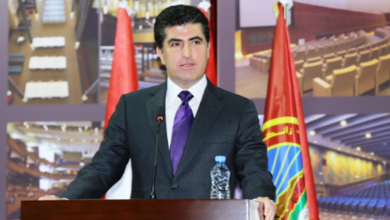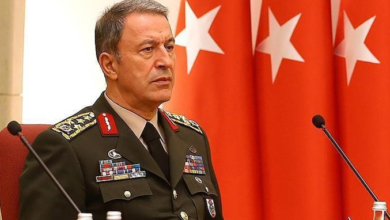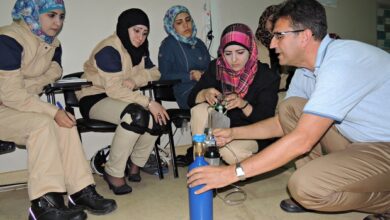
Kurdish history focus of collection published from British archives
Ismet Yüce: From what we’ve seen, you have been an editing an archive of Middle Eastern studies. What was the source behind this idea? Why mainly the Middle East?
Anita Burdett: The Middle East was a geopolitical region chosen by the publisher (previously Archive Editions) which began in the 1980’s. I believe they experienced great success in publishing materials relating to Arabian boundary issues, and began to expand to other topics in the region. Initially I undertook country studies – say, The Records of Saudi Arabia, or The Records of Qatar. Then the records I identified inspired thematic approaches, such as my set on the Slave Trade into Arabia. Obviously when looking at the Gulf States as a researcher you then get interested in the Persian side of the Gulf, and so one’s interest expands.
Apart from Cambridge, have you been involved in archive studies of other academic and private institutions?
Yes, including Canadian government departments, museums and institutes in Arab Gulf states, for law firms (relating to history of international boundary claims), individual academics.
I am not an employee of Cambridge by the way. I am a freelance historical analyst/editor, just in the happy position of they’re publishing my work. Each book is a new and separately contained project.
It looks like these studies were very long and tiring. The studies were published with short intervals in between. Did you have any difficulties? What were the difficulties and how did you overcome them?
The intervals for publication were determined by CAE. It might have been I completed one project which didn’t get put through for publication straight away, as other projects took priority. So coincidentally two works could come out quite close together. For instance, the Kurdish set came out in 2015 but I conceived the project and researched it over 2009-2010, made editorial adjustments at a later date. I would say it involved about 18 months overall—that’s just my time—don’t forget the publishing staff put time in at several levels, then there is binding, etc. So it takes time to get these high quality sets to publication stage.
And it is never tiring, as the research is so compelling and challenging. And arranging the material, making editorial decisions, describing the documents, always has one re-visiting some exciting historical events.
You did similar publications and studies for different groups previously regarding the Arab World. What are the main differences between the current release of the Kurdish Collection and the previous publications?
The events traced involving the Kurds were so interesting and varied because of the spread of the Kurdish people across so many territories. It was very challenging to research because I had to be aware of possible materials found under Iraq, Persia, Syria, as well as Turkey, whereas records for say, Kuwait, are simply under the Gulf and in limited archival headings. I don’t think I have done anything too similar. I looked at Armenian boundaries, but that was 2 volumes, one of which was a map set, and really only looking at what was considered to be Armenia over a limited time. But with Kurds it was about a broader struggle involving nationalist aspirations.
To what extent do you think these documents are in archives? If there is, do you have any idea about the quality and content of them?
If you are asking about more documents, firstly I hope I have gathered up most of the available documents which relate to the title of the set. However there could be more but some would not be of the same level of importance. So you might find material on trade routes through Kurdistan, or missionary work, and more in private collections, but I was specifically drawing only on official government records. Within these, if the British did not have consular or diplomatic representation in an area, then there would be no reports. I think I note in my preface what type of records I chose and why.
During the studies, which kind of documents were more interesting for you and why? Were there any documents that you could not locate or publish?
Most interesting are vivid descriptions of Kurdish leaders or personalities at various levels which the British provide when they met someone. Also verbatim accounts of conversations with these, so that you feel you can hear them talk down through the years. Little anecdotes always stick. There was one young Kurdish tribal leader who was willing to exchange his new wife for the latest European rifle the British consul had.
Technically some documents could not be included if they were damaged, or the ink was faded, or they were tightly bound into what we call “guard books” so parts of the page were illegible. Such material was not that extensive – maybe 5%.
We want to know especially about Kurdish Archive, how did this idea occur? How long did you work on this? What kind of impact do you believe your archive will provide on Kurdish research and studies?
I got the idea from my other research into Iran, Iraq and a few small projects which were always referencing Kurds. Then the question I asked was why was a nation state not created during the Paris Peace Conference, and [I] just delved into the records. Then the material itself suggested the theme.I hope students who are not able to access London archives will make use of it, as I know these records are not digitised, therefore not accessible on the internet, and perhaps they will be inspired to ask questions and undertake more research.
You did excellent research on Kurdish Studies, particularly on contemporary history. That is a notable contribution to the Kurdish literature. Have you received any positive or negative feedback about this collection? Also can you talk about yourself?
I am very glad to have helped, but yours is the first interest I’m aware of.
Kurdish and Middle Eastern academics and researchers greeted these documents with great excitement. Would you able to provide further information?
I am surprised that they have not been consulted and used before by various academics. But then they would have only quoted from them and not necessarily shown the entire document. However to publish such a large collection does involve time, effort and expense, and it is because my publisher’s programme aims at presenting these mini-archives, having gathered them up from disparate records, that they were prepared to publish such a collection.
But the Kurdish-related documents are tricky to identify within the tens of thousands of volumes of archives connected to the region within the National Archives, and, to a lesser extent, the India Office Archive at the British Library. One does have to understand the Foreign Office structure and British interests in the region to predict where documents might be found. However as open government archives here in the UK, they are open to one and all to access.
Although I thought it was terrifically informative material to read, I was worried people would say, “yes, but we know this already”.
These documents are very important for Kurdish history. We thank you for presenting these documents.
I’m delighted that they will be consulted. But we must all thank the many clever and hardworking British consuls, sent by the Foreign Office to almost unknown territory, who wrote these informative dispatches.
Rudaw




